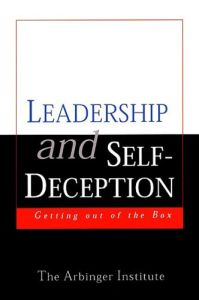Join getAbstract to access the summary!

Join getAbstract to access the summary!
The Arbinger Institute
Leadership and Self-Deception
Getting Out of the Box
Berrett-Koehler, 2000
What's inside?
If you wish to do something, and don’t do it, you’re betraying yourself. Then you dodge recognizing what you’ve done. This is self-deception, which launches a cascade of alienation and insincerity, undermining your leadership and your relationships. You can fulfill your goals. Go back. Shakespeare had it right in the first place: “To thine own self be true.”
Recommendation
Members of the Arbinger Institute have written an important book that has the potential to change the way you think, behave and live your life, both personally and professionally. This book simply and effectively addresses a core problem in human nature: self-deception. Presented as a series of conversations between two businessmen, one acting as a mentor to the other, the book walks you through the kinds of events that put you “in the box” of self-deception. Then, the book explains how you can get out of the box and, just as importantly, tells you how to avoid getting stuck in the box in the first place. The authors believe that self-deception is at the root of all conflict and lack of productivity. For that reason, getAbstract.com recommends this book to all who are concerned about motivation.
Summary
About the Author
The Arbinger Institute is a scholarly consortium and management training and consulting firm. It includes scholars, business leaders, and professionals who apply their experience and talents to writing about the sweeping implications of overcoming self-deception in all aspects of organizational, community and family life.
















Comment on this summary